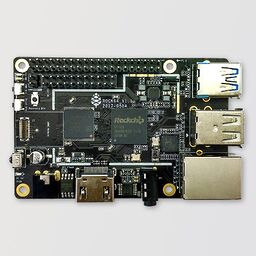NixOS on ARM/PINE64 ROCK64: Difference between revisions
imported>Lopsided98 Update product page URL |
imported>Mic92 |
||
| Line 28: | Line 28: | ||
This board has upstream U-Boot and kernel support, although the mainline kernel may still be missing some features. NixOS can be installed using manual partitioning and <code>nixos-install</code> or by modifying the aarch64 installation image as described in the next section. | This board has upstream U-Boot and kernel support, although the mainline kernel may still be missing some features. NixOS can be installed using manual partitioning and <code>nixos-install</code> or by modifying the aarch64 installation image as described in the next section. | ||
U-Boot for this board is packaged in nixpkgs, and Hydra builds can be found here: https://hydra.nixos.org/job/nixpkgs/trunk/ubootRock64.aarch64-linux | U-Boot for this board is packaged in nixpkgs, and Hydra builds can be found here: | ||
https://hydra.nixos.org/job/nixpkgs/trunk/ubootRock64.aarch64-linux | |||
This bootloader is not entirely open, incorporating a binary blob for the tertiary program loader (TPL). | This bootloader is not entirely open, incorporating a binary blob for the tertiary program loader (TPL). | ||
If your have nix installed you can download the latest version with: | |||
<syntaxHighlight lang=console> | |||
nix-store -r $(nix-instantiate --system 'aarch64-linux' --eval --expr 'with import <nixpkgs> {}; "${ubootRock64}"' | sed 's/"//g') | |||
</syntaxHighlight> | |||
The store path can be take from output nix-store. | |||
== Board-specific installation notes == | == Board-specific installation notes == | ||
Revision as of 18:20, 2 September 2020
| PINE64 ROCK64 | |
|---|---|

| |
| Manufacturer | PINE64 (Pine Microsystems Inc.) |
| Architecture | AArch64 |
| Bootloader | Upstream U-Boot |
| Boot options | microSD, eMMC, SPI NOR Flash |
The ROCK64 is a single board computer built around the Rockchip RK3328 SoC.
There are three models of the board, with 1, 2 or 4 GB of RAM. It can boot from an microSD card or an eMMC. It also has a 128 Mbit SPI flash that can be used to store the bootloader.
Status
This board has upstream U-Boot and kernel support, although the mainline kernel may still be missing some features. NixOS can be installed using manual partitioning and nixos-install or by modifying the aarch64 installation image as described in the next section.
U-Boot for this board is packaged in nixpkgs, and Hydra builds can be found here:
https://hydra.nixos.org/job/nixpkgs/trunk/ubootRock64.aarch64-linux
This bootloader is not entirely open, incorporating a binary blob for the tertiary program loader (TPL). If your have nix installed you can download the latest version with:
nix-store -r $(nix-instantiate --system 'aarch64-linux' --eval --expr 'with import <nixpkgs> {}; "${ubootRock64}"' | sed 's/"//g')
The store path can be take from output nix-store.
Board-specific installation notes
U-Boot needs to be copied to specific sectors on the microSD card, eMMC or image with dd. Download/build U-Boot for the board, and write idbloader.img and u-boot.itb to the correct locations with (replace /dev/mmcblkX with the correct path to the card or image):
dd if=idbloader.img of=/dev/mmcblkX conv=fsync,notrunc bs=512 seek=64
dd if=u-boot.itb of=/dev/mmcblkX conv=fsync,notrunc bs=512 seek=16384
Serial console
The ROCK64 uses a GPIO pinout compatible with the Raspberry Pi 2 and newer. This means that the following pins can be used to connect a serial adapter:
| Pi-2 Bus | |
|---|---|
| Pin | Function |
| 6 | GND |
| 8 | UART0_TX |
| 10 | UART0_RX |
The serial console runs at 1500000 baud in the bootloader. When using the standard NixOS aarch64 sd image, set console=ttyS2,115200n8 as kernel option in extlinux/extlinux.conf on the boot partition of the sdimage to get a serial linux console. For debugging, console=uart8250,mmio32,0xff130000 should give you an early UART console, before the full serial console is up.
Compatibility notes
| Mainline kernel | ayufan-rock64/linux-mainline-kernel | |
|---|---|---|
| Ethernet | Works | Works |
| USB | As of 5.4, USB 3.0 does not work | Works |
| HDMI | Works | Works |
Downstream kernel
To use all hardware functionality, it is currently necessary to use a downstream kernel:
- ayufan-rock64/linux-kernel 4.4 based on Rockchip BSP
- ayufan-rock64/linux-mainline-kernel mainline based, with potentially fewer hardware features supported. This kernel is not based on a kernel stable branch, so it may have more bugs (unrelated to the hardware).
